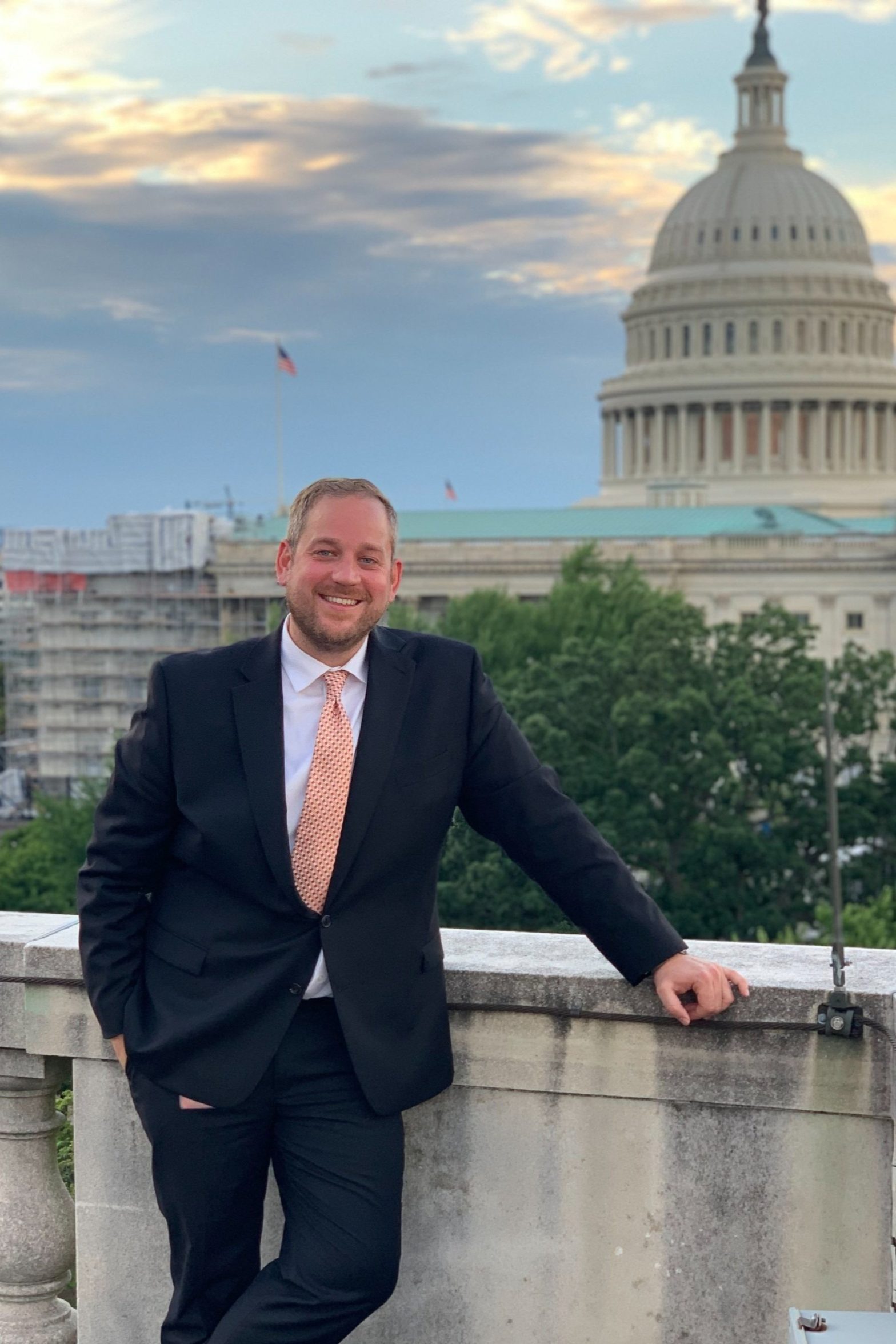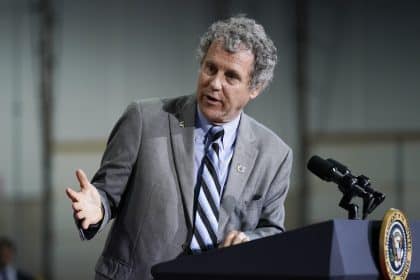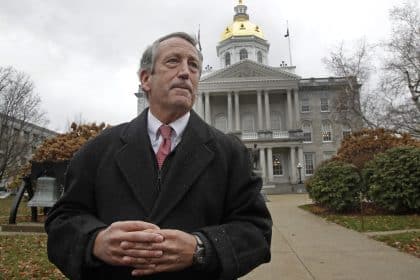After a Decade on Capitol Hill, Brad Howard Steps Out on His Own

WASHINGTON — After a decade on Capitol Hill, most recently as chief of staff for former Rep. Stephanie Murphy, D-Fla., and communications director of the Blue Dog Coalition, Brad Howard knew it was time for change.
“It was time to move into the private sector,” he said during a recent conversation with The Well News.
“The question was how to do it,” he said.
After briefly landing at the Vogel Group, the bipartisan lobbying shop based here in D.C., Howard said a different vision of his future began to crystallize.
“When you run an operation like Stephanie Murphy and I built together — choosing the staff, establishing the policies and values and then watching it succeed — there’s just … something so special in that,” he said.
“Ultimately I concluded, I wanted to try that again,” he said.
Howard’s new company, Corcoran Street Group, is built on the premise that there’s a better way to do lobbying, one “that blends with my unique background in communications.”
“Basically, I realized what I wanted was to have a lobby-heavy shop that could augment its efforts on behalf of clients with a little creative communications campaign boost,” he said.
Long known as a “key powerbroker for House moderates,” Howard enjoyed a number of perks during his years in the Capitol, including being granted rare walk-on status on the floor of the House by former Speaker Nancy Pelosi, D-Calif.
While things are different in the private sector, he said his passion for policy and politics continues to drive his professional life.
“When you work on Capitol Hill, especially if you’re a Democrat, you have this sense that every hour you stay after 5 p.m. and every morning that you get in at 7 a.m., you’re putting in that extra effort to effect positive change,” Howard said.
“I mean, you really do feel that sense of helping people and serving your country … and that’s a powerful feeling,” he said.
“The private sector is a little different,” he added. “You don’t have the same, direct sense of public service, but at the same time, you know that most companies — the entities that are now your clients — are out to do good by the customers and their shareholders. That’s the capitalist model.
“So what I’m doing now is basically an acknowledgement that everyone deserves representation in Congress. And what I do is help our clients craft a strategy that helps them serve their customers,” he said.
As he spoke, it was hard to miss the excitement in Howard’s voice. When that was brought to his attention, he laughed.
“You know, I honestly think that’s because I’m in kind of a perfect situation,” he said. “I still get to do politics and I still get to do policy, and I also get to do comms work. So for me, it’s just the perfect blend of all the things I love.”
Prior to his five years in Murphy’s office, Howard served as spokesperson for New Orleans Mayor Mitch Landrieu and several campaigns, and for a time during the Obama administration, briefly managed public affairs for the U.S. Small Business Administration’s Office of Advocacy.
Despite this broad experience, he admitted it can be challenging to be an advocate for a cause or company in an increasingly divided America.
“It really is a remarkable time,” Howard said. “Americans are consuming news and information from a variety of sources; members of the respective political parties are living in two different realities, and on top of that, you’ve got one of the slimmest majorities in both chambers of Congress in history.
“What that tells me, as a lobbyist, is that I better have relationships with members of both parties in both chambers — because there is only a small audience of what you might describe as the persuadable,” he continued.
“That’s where my experience working for my former boss, Stephanie Murphy, really helps,” Howard said.
“Prior to the recent redistricting, her district was rated as having zero partisan tilt. It was one-third Democratic, one-third Republican. And one-third nonpartisan or unaffiliated,” he said. “Now that’s a very difficult district to represent, as you can imagine, and we really had to read and not just trust what our party was telling us.
“That way we could understand the implications of the legislation for each of these constituencies in her district and make adjustments accordingly,” he said, adding, “Not everyone does that.
“Most people, you know how they are going to vote on a bill even before it comes to the floor, just based on their voting records,” he said.
Howard said in light of the current realities in Congress — realities he expects will last until at least the next redistricting after the 2030 census — it’s not just important to have friends on both sides of the aisle, it’s critical to have relationships with moderates on both sides of the aisle.
“People like Brian Fitzpatrick, R-Pa., and Josh Gottheimer, D-N.J., and coalitions like the Problem Solvers, the Blue Dogs, the New Dems, etc.; people who are actually willing to put partisanship aside to focus on policy.
“On the Senate side, Sen. Kyrsten Sinema, I-Ariz., was a masterclass in bipartisan negotiation, as is someone like Sen. Chris Coons, D-Del., who worked with Sen. James Lankford, R-Okla., on immigration.
“Now, that legislation ultimately didn’t pass, but it was a great bipartisan effort,” he said.
In short, Howard said, we’re living in an era in Washington, “where you have to be everywhere at one time.”
“So if you’re lobbying just by direct advocacy, having meetings, you’re missing the fuller picture,” he said.
To illustrate, Howard pointed to a simple reality: with the exception of those who have announced their retirements this year, members of Congress want to be reelected.
“And the people that decide whether or not they get reelected are their constituents,” he said. “That means, what their constituents care about, the members care about … So you’ve got to be not only talking to the members in Washington, you’ve got to be talking to their constituents back home.
“That means in addition to traditional lobbying, you have to be engaging in public affairs. That means getting reporters back home to write articles on your issue, and running op-eds and digital ads and grassroots advocacy … all with an eye toward building a coalition ‘back home’ to help you advocate for a certain issue,” he said.
“Again, this is where the blend of what I’ve done over the course of my career has proven effective. I think it allows me to manage an effort from all angles,” he said.
“To be successful in direct lobbying, you have to understand people’s points of view, you have to understand their districts, their partisan leanings, and then in light of all these things, you have to walk into their office with a recommendation that is reasonable and based in reality.
“Then, when you combine that with, say, an email or letter-writing campaign that’s flooding the office with messages, then you’ve got the policy member’s attention,” he said.
Howard added: “If you’re going to succeed in a legislative effort, you can’t take any chances. You’ve got to approach every issue from every angle.”
The obvious question was, does that apply to this Congress, one that’s been long on passing messaging bills, but has only advanced legislation to fully fund the government for the current fiscal year?
“Well, first you always have to have an honest conversation with your client,” Howard said. “You’ve got to sit down and talk about what is reasonable, what is doable, what’s going to take six months and what’s going to take six years.
“It’s important to be honest with your client in that regard because you don’t want to waste your time and you don’t want to waste their time. And you certainly don’t want to develop a reputation as being a lobbyist who walks into offices with ridiculous requests or requests that a member can’t possibly deliver on.
“Now, in this case, I’m afraid, these honest conversations almost always involve lowering expectations because this truly is the least productive Congress that we’ve seen since the 1800s. Things aren’t moving.
“But once you have that conversation and let reality sink in, then you start looking at the angles … because there are multiple ways to get a measure passed,” Howard said. “You can do it as a standalone bill. You can do it as an amendment on the House floor. You’ve got packages that move very quickly — we call them Christmas trees because everyone is hanging ‘ornaments’ on them as they speed toward passage.
“And then sometimes, you get that measure that passed the House, but didn’t make it in the Senate and fell apart in conference committee,” he continued. “Even then, you’ve made some progress and now you’ve got a marker.
“I remember in one case, one client wanted to get certain language in the National Defense Authorization Act,” he said. “Well, we got it through the House. The Senate didn’t move on it and there was this, sort of, informal pre-conference where our language got kicked out.
“So we came back the next year, rejiggering the language that caused the bill to fail the previous year, and it passed in both the House and the Senate. At that point we implemented a conference strategy that had members calling senators saying, ‘Please protect my language.’ And in the end they did and we got the language we wanted into the law.”
Howard said the key, no matter the Congress, is to understand the process.
“That’s one reason why I’ve read most of the Jefferson Manual, written by Thomas Jefferson in 1801, which is the first American book on parliamentary procedure,” he said. “The other important thing is to understand the rules committee, which is one of the most powerful committees in Congress, and the one that really determines what gets to the floor. How it’s debated, which amendments are put in an order, and what gets to the House floor.
“So there are all these different procedural ways of getting stuff done in Congress,” he said. “And then, with the divided government and Joe Biden heading into reelection, we’re anticipating starting to see this rollout of executive actions — and that’s why you want to have good relationships within the administration, and the ability to know what’s coming down the pike, who’s drafting it, what office is leading it, and try to influence it before it’s announced.”
As of March 12, 50 members of Congress — eight members of the U.S. Senate and 42 members of the U.S. House, many of them moderates — have announced they will not seek reelection in 2024.
Howard said it’s not the number of moderates who are leaving this cycle that’s a concern, but how many “very reasonable” people are leaving.
“Look at Reps. Kay Granger, R-Texas, or Cathy McMorris Rodgers, R-Wash.,” he said. “I wouldn’t call either of them a moderate. They’re definitely conservatives. But they are two very level-headed members who work with Democrats, make deals and try to keep the process moving.
“So the thing to despair is not the departure of moderates, per se, but the departure of people who have a reasonable belief in the institution and a commonsense approach to the job. That’s what’s really a danger for this Congress, that we’re losing so many of those people.
“Now, that said, it’s always good to have fresh blood in Congress. But I worry that the kinds of people I’m talking about are going to be replaced by folks who only speak to a small percentage of their district — the likely primary voters who often represent the most activist and partisan members of a party.”
Though this conversation with Howard took place while congressional leaders and the White House were still negotiating the just concluded deal to fully fund the government through the end of the fiscal year, his suggestion that potentially more extreme members might come to Congress grew even more salient after the House voted in favor of the last spending measure on Friday.
Moments later, Rep. Marjorie Taylor Greene, R-Ga., filed a motion to “vacate the chair,” a bid to remove Speaker Mike Johnson, R-La., from power.
During his interview with The Well News, Howard was asked how Pelosi kept rancorous elements of her caucus in line and what Johnson could learn from her example.
“One of the good things about the Democratic Caucus is that it is made up of all these different sub-caucuses. You have the progressives and the Blue Dogs, and you have the Black Caucus and the Hispanic and Asian caucuses. You have an LGBT Caucus. So you kind of have, in a very natural way, [many ways] for all these points of view to get expressed.
“What Speaker Pelosi did — and Minority Leader Hakeem Jeffries, D-N.Y., has continued this — is every week during session, she would have what’s called Crescendo. She would invite the heads of all the caucuses in and have them sit down at this table and say, ‘Okay, we have this issue we need to deal with.’ And she’d then let everyone argue for their position.
“The progressives would say, ‘That’s not bold enough.’ The Blue Dogs would say, ‘We’re going too fast.’ And she would essentially let them fight it out at the table while she nudged them in the direction she wanted to go in.
“So she might say to the Blue Dogs something like, ‘I was voting for a platform for fiscal responsibility before you even existed. So don’t tell me about being fiscally responsible here,’” Howard said. “Then she might say to the progressives, ‘I’ve been liberal from day one. I’m from San Francisco and I was advocating progressive policies when no one else was …’
“And as she’s doing this, of course, she was building up street cred with whatever group she was addressing,” he continued. “But the key thing is, she would really try to understand what they were thinking. She would listen. She had respect for every member’s point of view, and ensured no one was discounted.
“And finally, she’d try to help each member understand that maybe the way they wanted to go about things wasn’t the best way to achieve the results they wanted, and that her proposal would get them closer to those goals,” Howard said.
“The challenge Johnson has is that he simply hasn’t been in Congress long enough to form a basic understanding of his fellow members,” he said. “Pelosi had been in Congress a long, long time before she rose to the speakership.
“I mean, it’s obvious that once you understand people, and you build relationships, there’s a trust and respect there that allows you to negotiate from a better place,” Howard said.
“So I think Johnson has to really do some serious outreach to the members of his caucus,” he said. “The other thing is, he’s got to hold to his positions.
“Nancy Pelosi would say, ‘Here’s where we are going. We’re going in this direction because this is what I’ve heard from the caucus. This is the plan. And come hell or high water, we are going to get this done.’
“Johnson seems to be all over the place. He seems to keep second guessing his positions or changing them, or reversing them. And it’s creating chaos in the Republican Conference because they don’t know where to go. And so I think that’s another important lesson he could learn from her.
“My advice to Johnson would be to reach out to Pelosi and ask her for some advice,” Howard said. “I think she has an incredible amount of respect for the institution and the office of speaker and think she would provide him with some good guidance.
“But I don’t think the Republicans are going to call on Nancy Pelosi anytime soon,” he said.
Dan can be reached at [email protected] and @DanMcCue
























